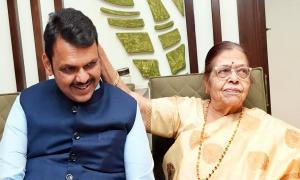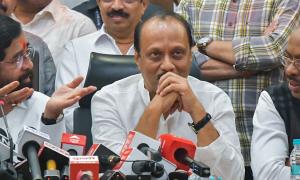
Earlier this month, the Intelligence Bureau reported to the information and broadcasting ministry about 'the onslaught of Pakistan Television programmes in Jammu & Kashmir.'
It then requested I&B ministry bureaucrats to urgently take measures to curtail or ban PTV's operations in the Indian territory.
"The minister is on election tours," The I&B officials replied. "No decision can be taken till the election is over."
The Atal Bihari Vajpayee government, it appears, is on a virtual three-month holiday these days.
As ministers led by Prime Minister Vajpayee sweat it out across the country campaigning for votes, it is a holiday mood in scores of government departments across Delhi.
Senior and junior government servants come to office late. They take long coffee and lunch breaks. They leave office early.
Not much work takes place these days in various secretariat buildings, including South and North Blocks.
Just stand outside Udyog Bhavan in the afternoon. Senior, junior officers and employees belonging to all classes begin to emerge from the industry ministry before 4 pm every day.
"Election time is the best time for us. Nothing really happens here," says a government staffer waiting for a bus outside Udyog Bhavan.
Former bureaucrats agree. "There is no pressure on most bureaucrats during election time. There are no day-to-day deadlines to keep. The government is virtually at a standstill these days," former Cabinet secretary T S R Subramaniam told rediff.com
But the ex-top bureaucrat argues that it happens in any democracy during election time. "Only the routine functioning of government takes place during the poll period," he says.
The main reason for virtual non-functioning of the government is the Election Commission's Model Code of Conduct.
The Code says ministers cannot combine official visits with electioneering and cannot sanction grants and payments out of discretionary funds.
During an election, there are no official inaugurations and no government appointments.
According to Subramaniam the bulk of government work is concentrated in parliamentary work, policy making and the preparation of bills, grants and budgetary allocations.
Out of this, he says, no parliamentary work happens during election time. Both Houses of Parliament -- the Rajya Sabha and Lok Sabha -- are on virtual holiday.
Secondly, he says there is no policy making "because elections are a transition period."
"Bureaucrats are free these days, so they go on holidays during elections," Subramaniam says.
There has also been negligible diplomatic activity at the ministry of external affairs since March. No foreign dignitary is scheduled to arrive in India till June.
The last high profile diplomatic visit to India was on March 16, when US Secretary of State Colin Powell visited New Delhi.
Zanzibar President Amani Abeid Kaurme was the last head of State to call on Vajpayee, in the first week of March.
At the defence ministry, the last high-level foreign delegation was from China. A Chinese defence delegation led by Defence Minister General Cao Gangchuan met with Defence Minister George Fernandes last month.
The ministry of external affairs has postponed the technical India-Pakistan talks on the Srinagar-Muzaffarabad bus service scheduled for April 8-9. Ministry officials said the talks were postponed "because of elections."
Most ministers in the Vajpayee government have not visited their offices for weeks because, as Subramaniam says, "they do not need to."
A senior officer at the ministry of rural development says it is not correct to say that the government is on vacation these days.
"It is true that there is no heightened activity in ministries, but this is the time for us to complete housekeeping in various departments," he says.
"To the public eye it may appear that nothing is happening in the government. But there is lot of routine work being done in any department," he adds.
Two ministries clearly not in holiday mode are the finance and home ministries.
Home ministry officials have to arrange security for the election. "We are overworking these days," one home ministry official said.
Finance Minister Jaswant Singh -- a member of the Rajya Sabha, and hence under no pressure to get re-elected -- may be the only minister in the Vajpayee government who regularly attends office when he is in Delhi.
His ministry is currently preparing for the 2004-05 Budget in the event that the Vajpayee government is re-elected.
Officials at the ministry say Singh has initiated the pre-Budget exercise from Thursday, April 15.
He has asked the revenue department to assess the sectoral impact of the indirect tax concessions that the Vajpayee government announced in January as well as in last year's Budget.
Singh has also held a number of meetings with officials at the Central Board of Excise and Customs and the Central Board of Direct Taxes to formulate the 2004-05 Budget.
"Ninety seven percent of budgetary work is being done these days by officials. Only 3 percent will remain for the political establishment to decide how the new Budget should be shaped," a finance ministry official said.
Image: Rahil Shaikh








More from rediff